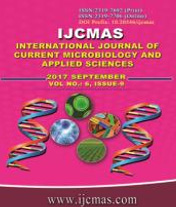


 National Academy of Agricultural Sciences (NAAS)
National Academy of Agricultural Sciences (NAAS)

|
PRINT ISSN : 2319-7692
Online ISSN : 2319-7706 Issues : 12 per year Publisher : Excellent Publishers Email : editorijcmas@gmail.com / submit@ijcmas.com Editor-in-chief: Dr.M.Prakash Index Copernicus ICV 2018: 95.39 NAAS RATING 2020: 5.38 |
Cowpea is an important leguminous vegetable crop usually grown during Pre-kharif, Kharif and Rabi season under West Bengal condition. Now days this crop is severely affected due to biotic stress. Seven foliar pathogens namely Alternaria alternata, Colletotrichum capsici, Corynespora cassicola, Rhizoctonia solani, Fusarium ciceri, Sclerotium rolfsii and Curvularia lunata were isolated from the diseased cowpea crop in Jaguli Instructional farm of BCKV. From the legume field crop two Trichoderma isolates namely T. harzianum and T. viride were isolated from rhizosphere soil of cowpea. In-vitro efficacy of this Trichoderma isolates were measured on Bell’s scale and accordingly percent inhibition also calculated after dual plate technique. Maximum and minimum inhibition was obtained in case of Sclerotium rolfsii (64.4%) and Rhizoctonia solani (42.2%) respectively against T. harzianum. T. viride also become effective and percent inhibition range from 31.4 – 60.9%. Maximum and minimum inhibition was obtained in case of Colletotrichum capsici (60.9%) and Fusarium ciceri (31.4%) respectively. T. harzianum completely overgrew the pathogen in most of the cases except one or two and antagonistic potential as per Bell’s scale was S1 in most of the cases. In case of T. viride it covered 2/3rd of the petriplate and restricted the growth of the pathogen with a fine zonation. Antagonistic potential as per Bell’s scale was S2 in most of the cases. Finally these two isolates of Trichoderma may be effectively employed for managing Sclerotium rolfsii, Rhizoctonia solani, Colletotrichum capsici and Fusarium ciceri under integrated disease management (IDM) programme of cowpea.
 |
 |
 |
 |
 |